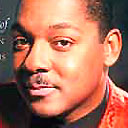
"We're not trying to recreate an era, or any foolishness like that," said Wynton Marsalis to Saturday's late-night Prom audience. None the less, for about 70% of his 90 minutes, the chief oracle of the back-to-basics movement in late 20th-century jazz led his Lincoln Center Jazz Orchestra in reprising the hits of the great swing bands of the 1940s and 1950s.
Marsalis and the band usually play this repertoire for dances these days - for America's version of a Prom, the formal student graduation ball, which still invariably involves a swing musical element. London's Promenaders, therefore, shoulder to shoulder like bowling-pins, were hardly in a position to respond the way this programme intended, and the result, went through periods of a becalmed, rather humdrum respectability.
It took three originals to lift the show out of its overawed atmosphere: a remarkable feature for drummer Herlin Riley, an episode from Marsalis's excellent jazz opera Blood On the Fields and a sly and subtle take on the big-band steam-train formula.
The early stages amounted to a classical concert for swing, and the audience breathed a sigh of grateful recognition when Marsalis kicked in with Stomping at the Savoy - a smooth mid-tempo saunter over Herlin Riley's casual rimshots. Benny Carter's Symphony in Riffs was an elegant exploration of harmony in sultry motion.
It was Duke Ellington's Portrait of Louis Armstrong that brought the first explosive moments. The leader launched a trumpet oration on this Ellington rarity that was evocative of its inspiration and pure Marsalis at the same time. Its stretching of the rhythm, peremptory trills and final free-fall from high, skipping figures through swerving runs to throaty growls brought a roar from the crowd. Marsalis's solos showed him to be at the top of his game all night, masterful in their sweeping range of colouration and effects, pin-sharp timing and startling turns of phrase.
Alto saxophonist Wess Anderson made a tasteful job of the lovely Billy Strayhorn ballad Isfahan without quite catching its diaphanous mystery, and Frank Foster's Basie classic Shiny Stockings was delivered at an appropriately lazy purr. But Herlin Riley's drum extravaganza was a one-man riot, bending the pitch of the heads, playing tambourine against a surging bass-drum groove, and sometimes sounding like a military band in the midst of exuberant demobilisation.
Wynton Marsalis's laughing - and eventually weeping - trumpet sounds on the Blood On the Fields feature brought some of the most urgently punchy section playing from the band beneath him, a boiling, grappling dance of swinging melody. And Big Train, with the band producing the clatter of the wheels by softly stamping their feet, and ending simply with a massive exhalation of hissing breath was a makeover of a traditional jazz device fresh enough to be a tour de force.

